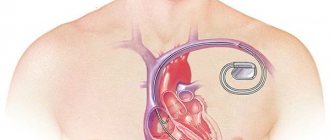Classification
Heart failure is a very dangerous condition in which the heart is unable to sufficiently perform its functions.
As a result, the organs and all tissues of the body do not receive the required amount of blood, which supplies oxygen and nutrients. This disease has several stages of development, the most dangerous, the third, is decompensation. Heart failure in the decompensation stage often leads to death. In this case, the heart fails to cope with its task not only during physical or emotional stress, but even if the person is in a calm state. This form is irreversible, and therefore so dangerous.
Decompensated heart failure is characterized by:
- Enlargement of the myocardium, or rather, its stretching and thinning.
- Fluid retention in the body.
- Rapid decrease in cardiac output.
- Swelling of the myocardium.
The chronic form of decompensation is a long-term process, that is, this pathology develops over the course of years, and at the same time progresses. Its peculiarity lies in the fact that due to any damage to the organ (necrosis, inflammation, dysplasia), the myocardial cells change. This affects its functioning. But the cells that are not yet affected do the work of compensating for the dysfunction of the affected myocytes. Then decompensation occurs, and the heart is not able to pump blood in the required quantity.
Decompensated heart failure is divided by location:
- Pathology of the left ventricle. Diastolic type - in this case the cavity is not able to receive the required amount of blood. This is fraught with overload of the left atrium and congestion in the lungs. But cardiac output into the aorta is still preserved. Systolic type - the left ventricle is dilated, cardiac output is reduced. The contractile function of the ventricle is impaired.
- Pathology of the right ventricle. It is characterized by a stagnant process in the systemic circulation, while the small circulation is insufficiently supplied with blood.
- Mixed form. It is very rare. It is characterized by dysfunction of both the left and right ventricles.
How to live with CHF?
13.07.2020
17710
0
Chronic heart failure... The term "failure" does not mean that the heart will soon stop working. The point is that it does not fully cope with the needs of the body (especially under load).
Chronic heart failure (CHF) is a complication of most heart diseases, associated with a dysfunction of the heart as a “pump” that can no longer provide sufficient blood output to maintain the needs of the human body.
The most common causes of the development of CHF include coronary heart disease, previous myocardial infarction, hypertension, congenital or acquired heart defects, and arrhythmias. Heart failure can develop at any age, but is most often seen in older people.
Heart failure manifests itself as shortness of breath during exercise and at rest, often suffocation at night, the appearance and increase of swelling of the legs, an increase in the size of the abdomen, weight gain, severe general weakness and increased fatigue with minor exertion. The reason for this is the excessive accumulation of fluid in all tissues and organs. The stage of compensation, or stable condition of the patient, and the stage of decompensation (unstable condition) are distinguished.
If you suspect you have symptoms of heart failure, you should talk to your doctor (primarily your primary care physician).
The doctor will conduct a thorough examination and ask about symptoms of the disease, medical history and lifestyle. It is extremely important to answer all questions as honestly and thoroughly as possible. Only in this case will the doctor be able to make an accurate diagnosis and develop a treatment plan.
If your doctor suspects you have heart failure, you may need to undergo some tests. These tests will show whether your heart is working well. If a problem is found, research will show what is causing it.
Key studies include:
- history taking and medical examination;
- electrocardiogram (ECG);
- blood tests;
- chest x-ray;
- Ultrasound of the heart.
The symptoms of each patient are individual, depending on them, other additional examination methods may be prescribed to clarify the diagnosis.
The progression of heart failure is unpredictable and occurs individually for each person. In many cases, symptoms remain stable for some time (months or years) before getting worse. In some cases, the severity and symptoms of the disease worsen gradually. Or they can progress rapidly, which could be, for example, a consequence of a new myocardial infarction, heart rhythm disorder or lung disease.
The most common causes of decompensated heart failure:
- Excessive intake of salt and liquid.
- Unauthorized cessation of medication or dose reduction.
- Excessive physical activity.
- Colds.
- Taking painkillers and anti-inflammatory drugs (diclofenac, nimesil, ibuprofen, analgin).
- Drinking alcoholic or low-alcohol drinks (in particular beer and kvass).
- Stress, nervous tension.
- Chronic lack of sleep.
Heart failure is a chronic condition that tends to get worse over time. Sometimes it can shorten life expectancy.
The main thing to understand is that careful management of the disease can both relieve symptoms and improve prognosis and prolong life.
If your doctor tells you that a diagnosis of CHF has been made, you must follow four main types of recommendations:
- Lifestyle recommendations.
- Recommendations for home self-control.
- Recommendations for drug therapy.
- Recommendations for physical rehabilitation.
Lifestyle recommendations
The daily intake of liquid is 1.5 liters/day and includes all liquids consumed per day, including tea, juice, kefir, soup, fruits and vegetables. If you experience dry mouth and thirst, you should: rinse your mouth, add lemon or a piece of ice to the water, and take a small sip of water. Do not drink coffee - it increases the feeling of thirst. The intake of table salt is limited, the daily norm of sodium chloride is a teaspoon and do not forget that salt is added to food, so do not add salt to ready-made dishes and do not eat salty foods. It is recommended to stop drinking all types of alcoholic beverages and quit smoking. It is not recommended to take a steam bath or visit a sauna.
Recommendations for home self-monitoring
Body weight monitoring is prescribed daily in the morning on an empty stomach in the same clothes and keeping a self-monitoring diary. There should not be a weight gain of 1-1.5 kg per day, as this may indicate fluid retention and a doctor’s advice on correcting therapy is necessary. Indicators for home self-monitoring also include measuring blood pressure 2 times a day in the morning and evening and monitoring pulse. This can be done using an automatic blood pressure monitor. These indicators should be recorded in the patient’s diary so that they can be shown to the attending physician at the next visit.
Recommendations for drug therapy
The main rule: regular and long-term use of medications. It should not be interrupted or canceled without the consent of the doctor, take breaks for several days, as this may worsen the condition. A combination of drugs is often used for treatment. The number of tablets and treatment regimen are selected by the doctor and are individual for each patient.
General rules regarding taking medications:
- Always keep at hand a list of medications you are taking, indicating their doses and frequency of administration.
- Take your medications at the same time every day.
- Don't skip taking your medications.
- If you forget to take your medications on time, do not take a double dose at your next appointment.
- Do not change the dose of the drug yourself.
Recommendations for physical rehabilitation
Optimal types of exercise: walking, swimming, cycling. It is easier to start physical training with exercises that do not require supporting your own weight. For example, from riding an exercise bike or walking in the pool. This type of physical activity is beneficial at any age.
The first exercises may not exceed 5-10 minutes in duration; their duration can be gradually increased at such a pace that after three to four weeks the physical activity time is 30-40 minutes per day. It is necessary to discuss the limits of physical activity with your doctor and not go beyond them. Physical exercise should be performed two hours after eating and taking medications. It is recommended to avoid exercises that require holding your breath, as well as those that involve hypothermia or overheating. You should not perform any exercise if you feel unwell. It is necessary to immediately stop performing exercises if there is pain in the chest, unusually severe difficulty breathing, severe weakness, severe dizziness, rapid or sharply slow heartbeat. In these cases, you must immediately contact your doctor or call an ambulance.
Today, the most effective approach to getting heart disease under control is to combine medical treatment with lifestyle changes and managing emotions and habits. That's why it's so important to follow all your doctor's advice and do everything you can to change your lifestyle: this will help reduce the symptoms of heart failure and prevent the disease from progressing.
Symptoms
Pathology exhibits quite a lot of symptoms. There are no specific signs by which the disease can be accurately diagnosed.
Decompensated heart failure is a consequence of other heart diseases, so the clinical picture is quite varied, as some symptoms overlap with others.
The main symptoms of decompensated heart failure:
- Dyspnea. It manifests itself under light loads, but if there is no appropriate treatment, the pathology progresses and is disturbing, even if the person is in a calm state. This occurs due to congestion in the lungs.
- Swelling of the legs and arms. They are explained by impaired outflow of fluid from the body. In this case, the heart muscle is also affected.
- Dry cough.
- Pain or discomfort in the right hypochondrium.
- Ascites is dropsy in the abdominal cavity. At the same time, the stomach and weight of a person increase significantly.
- General weakness, feeling of overwork.
- Cold feet and hands.
- Small amount of urine, rare urge to urinate.
During examination, doctors detect wheezing in the lungs, arrhythmia, and congestive processes. There is an increase in pressure in the jugular vein.
Treatment methods for chronic heart failure
The main task in the treatment of CHF is to achieve stabilization of the underlying disease. Various specialists can be involved in achieving this. For example, if heart failure is caused by cardiac arrhythmia tachyform on the background of autoimmune thyroiditis with hyperthyroidism, the patient should be monitored by both a cardiologist and an endocrinologist.
Acute respiratory diseases can cause exacerbation of chronic diseases, including worsening the severity of CHF, and therefore it is recommended to prevent ARVI, i.e., for example, get vaccinated before the onset of the epidemic season.
Drug treatment
Different groups of drugs are used. The approach in each case will be individual - depending on the concomitant pathology and the reasons that caused the exacerbation of the disease.
Make an appointment Do not self-medicate. Contact our specialists who will correctly diagnose and prescribe treatment.
Rate how useful the material was
thank you for rating
Causes
The causes of chronic heart failure in the decompensation stage are various diseases of the cardiovascular system that were not treated in time.
Decompensated heart failure occurs for the following reasons:
- Hypertension, or rather, a hypertensive crisis can trigger an irreversible process.
- Congenital heart defects. These are abnormalities of the heart valves, as a result of which cardiac function fails.
- Myocarditis.
- Stable tachyarrhythmia.
- Hypertrophic type cardiomyopathy.
The above reasons relate to cardiac pathologies. Other factors can also cause heart failure:
- Chronic alcoholism.
- Poisoning of the body of a bacterial-toxic type.
- Bronchial asthma, which was not treated and became advanced.
- Incorrect treatment or its absence at the first stage of the pathology.
- Obesity.
- Diabetes.
Acute form of the disease
The body’s inability to cope with rapid decompensation in acute forms of heart failure gives the right to classify this pathology as decompensated in almost every case.
The causes of the critical condition have not yet been determined, but experts believe that it occurs when the rules of treatment and diet for a concomitant disease are not followed.
The occurrence of left-sided acute failure is directly related to the following conditions:
- myocardial infarction;
- mitral valve stenosis;
- severe hypertensive crisis;
- congenital or acquired heart valve defects;
- malignant metastatic tumor processes;
- sepsis, etc.
Overflow of the pulmonary vessels with blood, resulting from the inability of the heart to pump blood, provokes the occurrence of pulmonary failure and pulmonary edema.
Right-sided localization of the pathological process is observed as a result of:
- pulmonary embolism;
- massive myocardial infarction with internal rupture (interventricular septum rupture);
- unilateral or bilateral pneumonia;
- pleurisy or pericarditis.
The systemic circulation is subject to stagnation, which leads to accumulation of blood in the lungs and liver. These processes are fraught with the occurrence of liver failure, edema or pulmonary infarction, which cannot exclude death.
In most cases, right ventricular failure occurs due to acute pathological changes in the lung tissue.
A patient exposed to an acute form of the disease requires medical attention, which should follow immediately if the following manifestations occur:
- increasing shortness of breath (difficulty in breathing is especially pronounced if the patient wants to take a lying position);
- noisy breathing;
- cough, which can have a different character (dry, containing putrid or red sputum, pink foam, accompanied by pain in the heart, etc.);
- cyanosis on the lips, tip of the nose;
- feelings of anxiety, unreasonable fear.
With these symptoms, the patient requires hospital treatment, but to prevent death, he must be provided with immediate pre-medical care.
Treatment
Before prescribing a treatment method and specific medications, the doctor conducts a full examination. This includes studying the medical history, since if the last stage of the disease has developed, then the person already has a medical history. A physical examination is also performed.
The patient must undergo blood and urine tests. Instrumental studies include x-ray and echocardiography. Modern diagnostic methods include MRI and CT. They are very informative and can be prescribed instead of x-rays and ultrasound. After the necessary studies, medications are prescribed.
Treatment should be aimed at eliminating decompensation of the body and restoring its basic functions, neutralizing stagnant processes. Therapy must be carried out under the supervision of doctors, that is, only in a hospital setting. The patient needs bed rest; any stress (physical and emotional) must be excluded. The patient should periodically sit down or take a few steps. This will help prevent stagnation and the formation of blood clots.
Drug therapy
Decompensated heart failure is treated with a complex of various drugs. It is important to take:
- ACE inhibitors.
- Beta inhibitors. These drugs help reduce myocardial demand.
- Cardiac glycosides. These drugs help increase cardiac output.
- Aldosterone antagonists. These drugs increase blood pressure and remove excess fluid from the body.
- Antiarrhythmic drugs.
It is important to take antihypertensive drugs, drugs that affect the rheological quality of blood and lipid metabolism. Additionally, diuretics are required.
For advanced heart failure, other medications are also prescribed. Since the whole body suffers from cardiac dysfunction, it is necessary to take hepatoprotectors, immunomodulators and vitamin complexes.
It is important that a complex of drugs is prescribed by a qualified specialist, because all heart medications have a fairly large list of side effects. Only a doctor can prescribe therapy based on all the individual characteristics of the patient’s body in order to reduce the likelihood of such actions affecting the body.
Surgical operations
Most often, surgical treatment is prescribed for cardiac decompensation. These methods include:
- vascular bypass;
- coronary angioplasty;
- installation of a defibrillator or pacemaker.
Radical surgical treatment is prescribed to patients who have irreversible changes in the structure of organs. This may require a lung, heart or large artery transplant.
In case of heart failure of the left ventricle, patients are implanted with a special device that functions for it. Some time ago, doctors installed this device temporarily, before a heart transplant, but now it has been proven that it significantly prolongs the life of patients.
Heart failure in the stage of decompensation is a serious condition in which in most cases death occurs. Therefore, self-medication in this case is simply contraindicated. According to statistics, about 75% of men and 62% of women do not live more than 5 years with this pathology. But such figures are due to the fact that people do not consult doctors in a timely manner.
Methods for diagnosing chronic heart failure
The central place in the diagnosis of CHF is occupied by instrumental diagnostic methods: chest radiography, ECG and echocardiography.
Laboratory diagnostics for CHF, in addition to the standard examination (general blood count, blood biochemistry - lipid profile assessment), may include an indicator such as brain natriuretic peptide, or BNP (brain natriuretic peptide) - a peptide hormone that is produced by heart cells in response for excessive stretching. This analysis is prescribed only by a doctor if necessary and has interpretation features.
If necessary, to clarify the nature of CHF, an MRI of the heart with contrast can be performed - to exclude myocarditis - or coronary angiography (if coronary artery disease is suspected).
X-ray of the chest organs
X-ray of the chest organs shows the presence of congestion in the pulmonary circulation, fluid in the pleural cavities, which indicates the presence of heart failure (this is what causes shortness of breath in CHF).
More information about the diagnostic method
ECG
An ECG often reveals left bundle branch block or scar changes in the myocardium after a myocardial infarction, as well as cardiac arrhythmias, which can cause heart failure.
More information about the diagnostic method
Echocardiography
According to echocardiography (ultrasound of the heart), you can see the size of the heart chambers, zones of hypokinesis, aneurysms, and other reasons that lead to the appearance of heart failure. The main indicator that doctors focus on is the ejection fraction (a value expressed as a percentage), which reflects the capabilities of the heart and is an indicator of the efficiency of its work.
More information about the diagnostic method
Sign up for diagnostics To accurately diagnose the disease, make an appointment with specialists from the Family Doctor network.










